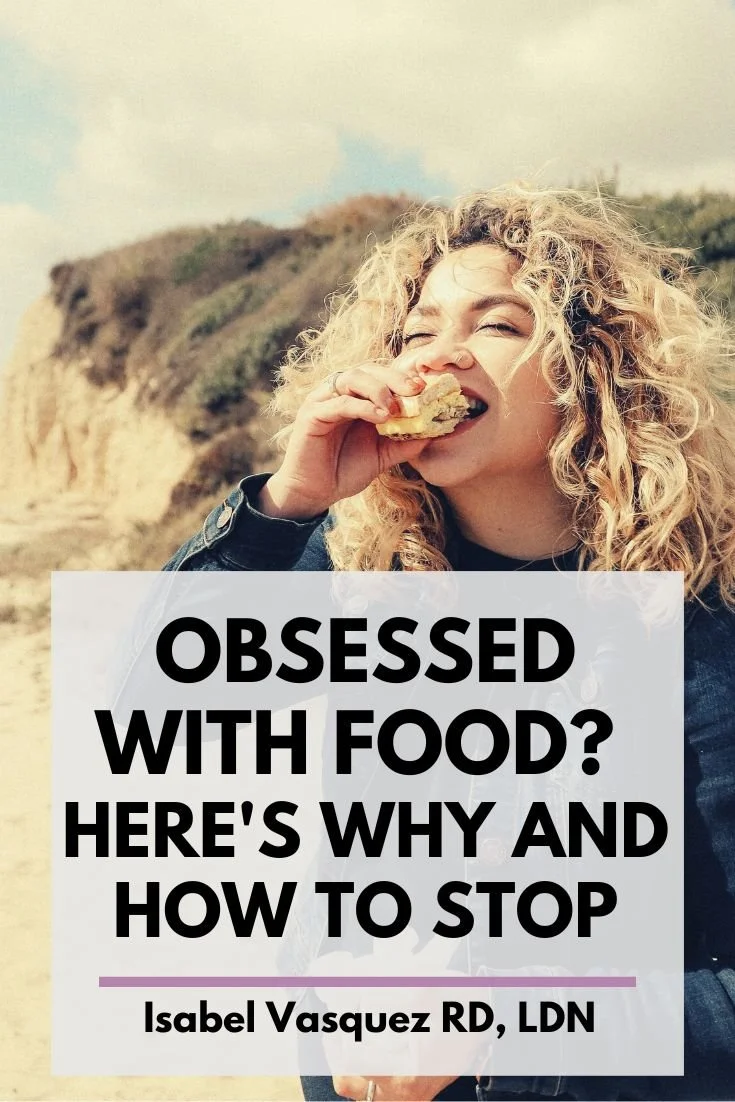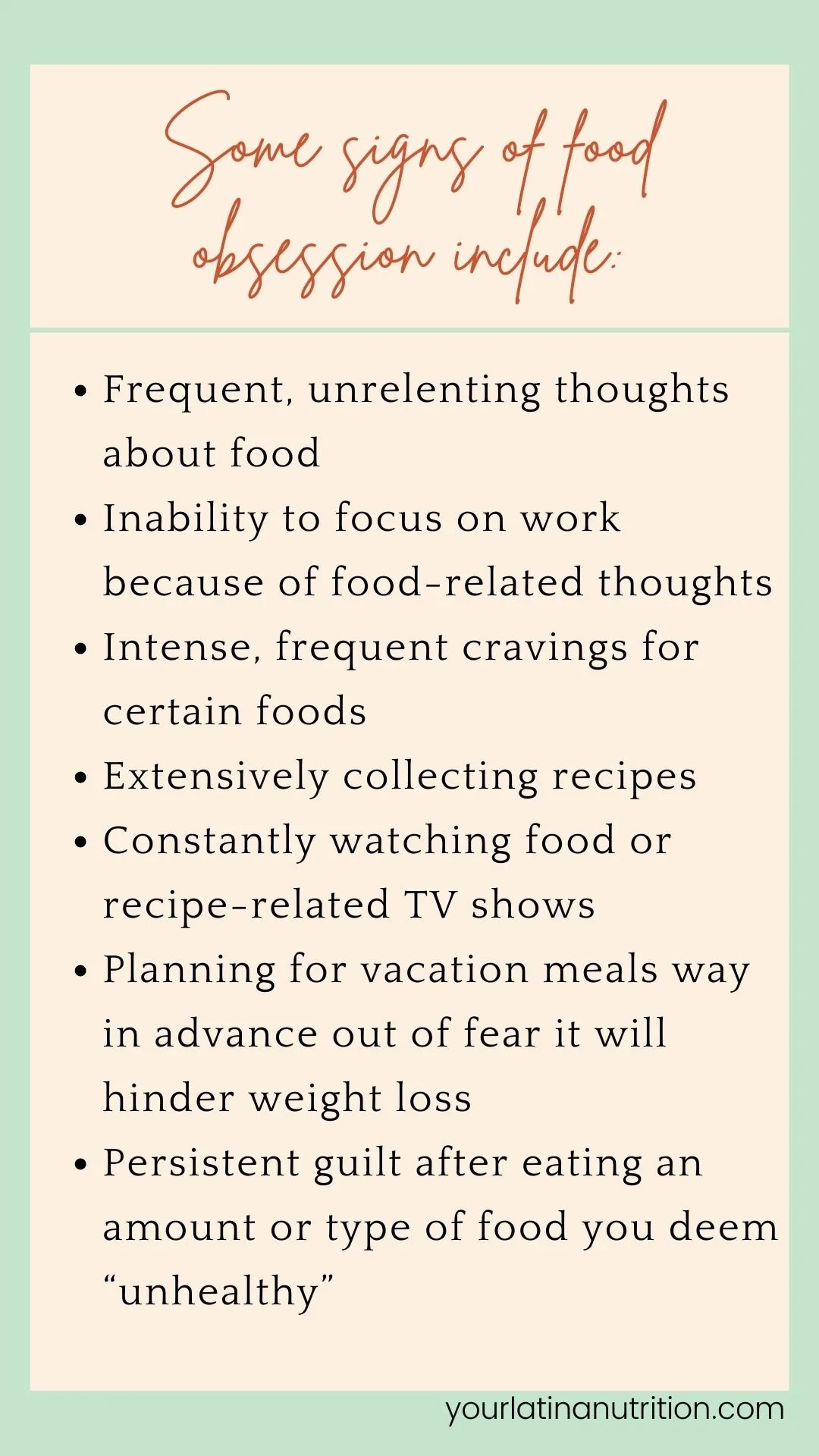Obsessed With Food? Here's why and how to stop.
Written by Isabel Vasquez RD, LDN
If you find yourself constantly thinking about food, you may wonder how to end the obsession. After all, constantly thinking about food can be draining
Food obsession is often caused by some kind of food restriction. You may be avoiding certain types of foods you deem as “bad”, not eating enough, or struggling with food insecurity.
In this blog, we’ll dive into what food obsession is, more on what causes it, and how to overcome it.
What is Food Obsession?
Food obsession is typically characterized by frequent thoughts about food despite your attempts to stop these thoughts. You may find yourself focusing on lunch right after breakfast or fantasizing about a meal in the middle of time with friends.
That being said, there are a variety of ways that food obsession can manifest. Some signs of food obsession include:
Frequent, unrelenting thoughts about food
Inability to focus on work because of food-related thoughts
Intense, frequent cravings for certain foods
Constantly watching food or recipe-related TV shows
Scouring the menu before going out to eat to check the calories or nutrition profile of the restaurant’s options
Stressing over holiday meals out of fear of the calories, macros, or health value of the food
Persistent guilt after eating an amount or type of food you deem “unhealthy”
What Causes Food Obsession?
Restricting The Amount Of Food You Eat
Believe it or not, to stop food obsession, you may just need to eat more. If you haven’t eaten enough, your body will do what it takes to help you survive. In this case, that means centering your thoughts around food.
Especially if you have been restricting food for a while (e.g. due to an eating disorder or chronic dieting), your body may feel threatened and go into survival mode.
In fact, studies show that diet-induced weight loss can increase the production of hunger hormones.
In turn, your thoughts will gravitate towards food because that’s what your body needs most to survive and thrive.
Restricting Certain Types Of Food
Restricting the types of food you eat can also lead to food obsession. The underlying cause is similar to when you restrict your overall energy intake.
Limiting certain types of food can cause your body to sense scarcity.
For example, I often see clients limiting carbohydrates, but our bodies need carbohydrates to function. They are the main source of energy for your cells, tissues, and organs, per Medline Plus.
Plus, restricting certain foods and filling up on water, caffeine, or low-calorie foods instead may prevent you from meeting your overall energy needs.
Unfortunately, many people don’t realize that the restriction is fueling the obsession. They decide to avoid keeping these foods in the house in hopes that it will solve their “problem” with the food, when in reality, it only makes it worse.
Food Insecurity
Feeding America defines food insecurity as “a lack of consistent access to enough food for every person in a household to live an active, healthy life”.
This differs from the two types of restriction noted above because food insecurity is a systemic issue and not a choice an individual or family makes. That being said, it can still greatly harm your relationship to food.
In fact, research, like this 2020 study published in Current Psychiatry Reports, has found that food insecurity is strongly linked with binge eating, binge-eating disorder, and bulimia nervosa.
Ultimately, it triggers your brain’s survival system to increase your drive towards and obsession with food. The difference is that food insecurity is not self-inflicted, but rather, a result of your environment.
Mental Restriction
A sneakier form of food restriction is psychological or mental restriction. You may be reading this and thinking…
But I let myself eat everything I want!
I stopped dieting a while ago
I let myself eat cake, cookies, and chips now.
But I still can’t stop obsessing over food!
If you’re eating the foods you once restricted but you’re shaming yourself for eating them, it may not eliminate the food obsession. Practice letting go of food guilt with the tips in this article.
Not Eating Well-Rounded Meals and Snacks
Another reason your body may feel deprived is if you aren’t eating well-rounded meals and snacks. We suggest incorporating a source of carbs, protein, fat, and fiber at every meal. For snacks, try incorporating at least two food groups.
This helps you get all of the macro and micronutrients you need for overall health. It also helps you to feel satisfied until your next meal or snack so you won’t experience obsessive thoughts about food within an hour or two of eating.
For individualized support practicing gentle nutrition and improving your relationship with food, work with one of our dietitians.
Food Obsession and Eating Disorders
Food obsession is often present with eating disorders since most of them involve some level of food restriction.
That being said, plenty of people experience food obsession without meeting diagnostic criteria for an eating disorder.
If you think you or a loved one may be struggling with an eating disorder, Project Heal has resources for screening and support.
How to Overcome Food Obsession
The means of overcoming food obsession depends on the root cause.
If you are struggling with food insecurity, then tapping into resources to increase your access to food is key. The USDA has information on Food Assistance Programs here.
If you are food secure, the following tips can help.
Reflect On Your Relationship With Food
Your relationship with food includes things like whether you experience guilt around eating, use food to cope with emotions, connect with your hunger and fullness cues, and have a scarcity mindset around food.
Even if you don’t self-identify as a dieter, there may be subtle ways diet culture is influencing your eating habits.
For example, you may not allow yourself to eat after a certain time of night or you may label chips as “bad” and judge yourself for wanting them.
When it comes to overcoming food obsession, reflect on whether there are ways you are restricting food.
Let Yourself Habituate To Forbidden Foods
If you find that you restrict certain types of foods, habituation is key to reducing your obsession with these foods. We always want what we can’t have. When you let yourself have the foods you’re restricting, the obsessive thoughts tend to diminish.
The authors of Intuitive Eating explain this, saying, “Research shows that people will tire of eating the same kind of food - it’s called habituation.” This often happens with leftovers. After a couple days, we tend to tire of eating the same thing. The same can happen with fear foods.
Eat Regular, Well-Rounded Meals and Snacks
As you now know, restriction is a major cause of food obsession. So, if you are not eating enough food overall, your mind will constantly gravitate towards food.
In order for your body and mind to feel safe and secure, they need enough food.
In general, most people need to eat something at least every 3-5 hours. This often means eating three well-rounded meals and 1-3 snacks per day.
Work With A Dietitian
If you’ve read this far, you may be wondering…
How do I know if I’m eating enough?
How much food do I really need to eat for my body to feel secure and for this food obsession to go away?
If so, working with a registered dietitian can help. A registered dietitian can assess your current diet and make individualized recommendations on how to meet your nutrition needs.
Here at Your Latina Nutrition, we offer 1:1 virtual nutrition counseling in 15 states, and we’re in network with most major insurance providers. Verify your benefits here.
Final Thoughts
Food obsession can be frustrating to experience. What may surprise you is that food obsession is often caused by food restriction. To stop food obsession, reflect on your relationship with food, reintroduce your forbidden foods, and make sure you’re eating enough overall.
Allowing yourself to eat without restriction and without centering weight loss can improve your mental health and help you to stop thinking about food all the time.
For education on how to ADD nutrition to your favorite Latine cultural dishes, make peace with food, and focus on your health without dieting, join our nutrition library for just $27/month.
If you liked this post, you may also like:
What Is The Binge Restrict Cycle?


